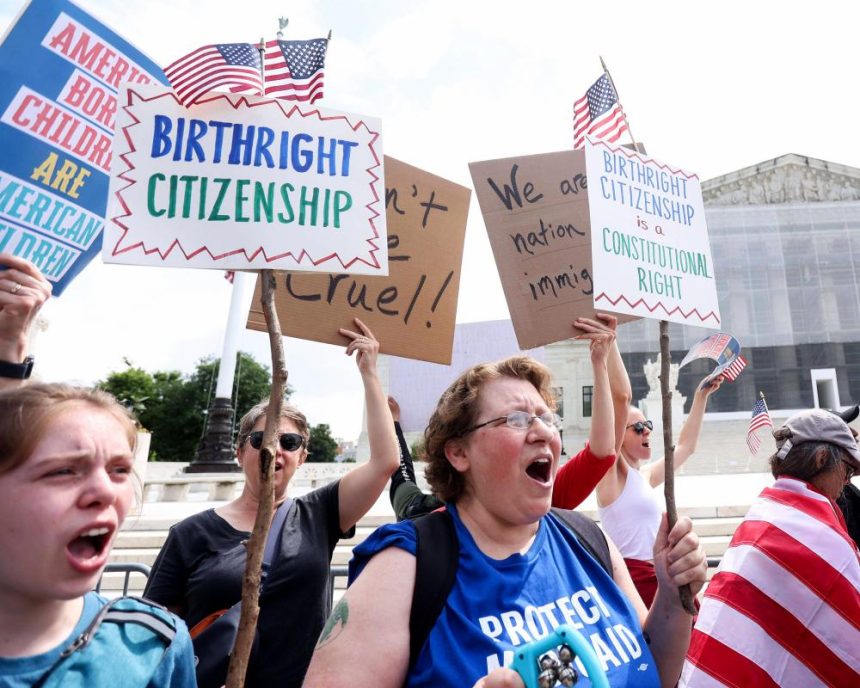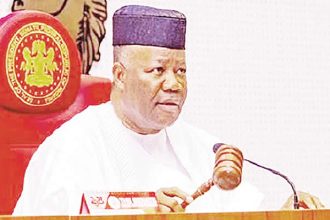A federal judge’s ruling last week to maintain a sweeping nationwide ban on Donald Trump’s birthright citizenship order highlights the dizzying legal battle that has defined the administration’s opening months, with courts issuing dozens of such sweeping orders to systematically halt abrasive elements of the president’s agenda.
US district judge Leo Sorokin in Boston rejected Trump administration arguments to narrow his nationwide injunction, a court order that prohibits the federal government from enforcing a law or policy against anyone across the nation, and not just the people who filed the legal challenge.
His decision represents just one case in a broader pattern of judicial resistance to Trump administration actions. Courts have issued an estimated 35 nationwide injunctions against various Trump executive orders and policy changes from his inauguration until the supreme court intervened on 27 June, according to a Guardian analysis of court records and Congressional Research Service data.
There’s no standard legal definition for a nationwide injunction, so it is not possible to provide a single definitive count, but the roughly 35 orders during Trump’s second term have halted a broad range of policies, from the president’s attempt to end birthright citizenship to restrictions on federal funding for diversity programs and changes to refugee resettlement.
In June, the supreme court significantly limited courts’ ability to issue nationwide injunctions, which fundamentally reshaped how opponents can challenge executive overreach and dismantled what some legal experts viewed as the most potent weapon against sweeping presidential policies. Without nationwide injunctions, challengers largely have to now pursue slower class-action lawsuits or file multiple suits across jurisdictions to achieve the same blocking effect, although the supreme court left the possibility for exceptions in some cases like Sorokin’s ruling, which found that nationwide relief was necessary to protect Americans from harm.
“President Trump’s illegal abuses of power have created widespread harm for Americans across the country including farmers, students, working families and retirees that demanded a national response,” said Donald Sherman, deputy director of Citizens for Responsibility and Ethics in Washington. “The supreme court’s decision has certainly made it more complex to challenge President Trump’s lawless executive actions and put an unnecessary strain on judicial resources, but legal advocates and concerned citizens will not be deterred from holding the administration accountable in court.”
During Trump’s first presidency, federal courts issued at least 64 nationwide injunctions against his administration, compared with 12 under Barack Obama’s eight-year presidency and just six under George W Bush’s two terms.
The White House has praised the supreme court’s June order, saying “low-level activist judges have been exploiting their positions” to deliberately cut down Trump’s policy agenda. Those injunctions were issued by courts in mostly Democratic-leaning states and jurisdictions, including Washington DC, California, Rhode Island, Maryland, Texas, Massachusetts, New York and others, according to a Guardian analysis.
Harvard Law Review research from Trump’s first term found that 92.2% of nationwide injunctions came from Democratic-appointed judges, while 100% of similar injunctions against Biden came from Republican-appointed judges.
The Guardian analysis of the 35 nationwide injunctions issued during the first six months of the Trump administration demonstrates the types of policies that had been blocked by courts using this tool. Immigration enforcement and citizenship changes have prompted at least eight major nationwide injunctions, including in the landmark birthright citizenship case, cases targeting refugee program defunding and deportation accelerations.
Federal funding policies have generated a wave of litigation, with at least six injunctions stopping various funding freezes and restrictions, stemming from suits filed by groups including the National Council of Nonprofits targeting funding freezes, and on targeting National Institutes of Health grants by the Association of American Medical Colleges.
Policies on diversity, equity and inclusion and civil rights face numerous legal challenges and have resulted in nationwide injunctions in at least five cases, including a suit by the National Association of Diversity Officers fighting restrictions under Trump’s executive orders.
At least two cases stemming from military service requirements stopped by nationwide injunctions fall into the same category, while federal agency restructuring has prompted suits from multiple state governments and federal employee unions and ended with nationwide injunctions.
Some injunctions focused on executive overreach and legal targeting, while additional injunctions stopped emergency tariffs under the International Emergency Economic Powers Act and restrictions on law firms that previously opposed Trump policies.
“Since the moment President Trump took office, low-level activist judges have been exploiting their positions to kneecap the agenda on which he was overwhelmingly elected,” the White House said in a statement after the supreme court’s ruling in June. “In fact, of the 40 nationwide injunctions filed against President Trump’s executive actions in his second term, 35 of them came from just five far-left jurisdictions: California, Maryland, Massachusetts, Washington, and the District of Columbia.”
The Guardian has not been able to identify 40 nationwide injunctions independently. The White House and the Department of Justice have not responded to requests for comment on which injunctions they have on their list.
The justice department has reportedly faced difficulties defending the volume of Trump’s executive orders, with lawyers struggling to answer judicial questions and correct the record in court, prompting the justice department to seek rapid transfers of attorneys to the division handling Trump policy defenses. The administration is also believed to be testing traditional presidential deference, the longstanding practice where courts generally defer to executive authority for national security and foreign affairs as it defends aggressive immigration, trade and economic policies, while taking the unprecedented step of suing federal judges who issue blocking orders.
Legal challenges have also targeted more specific policies, prompting nationwide injunctions in cases targeting restrictions on gender-affirming care in federal prisons, changes to passport gender markers and federal employment terminations affecting thousands of workers.
Following the supreme court decision in Trump v Casa in June, courts are now prohibited from issuing nationwide injunctions against presidential policies. But there is an exception, which comes when a judge decides it is the only way to fully protect the people bringing the lawsuit, like in the case of the birthright citizenship challenge.
The White House said: “Now, the Trump Administration can promptly proceed with critical action to save the country – like ending birthright citizenship, ceasing sanctuary city funding, suspending refugee resettlement, freezing unnecessary funding, stopping taxpayers from funding transgender surgeries, and much more.”
But some legal experts aren’t so sure on the long-term impact of the supreme court’s restrictions on nationwide injunctions just yet.
“I think it remains to be seen how the practical consequences of the supreme court’s decision shake out,” said Barbara McQuade, a University of Michigan law professor and former Obama-appointed US attorney. “Several of the justices suggested that class actions would provide a mechanism to block lawless executive orders and prevent irreparable harm, but, of course, class actions can be cumbersome and slower than a simple temporary restraining order.
“We will need to see how lower courts address the supreme court’s exception where necessary,” McQuade said.
For those in the crosshairs of Trump’s policies – like undocumented immigrants facing deportation and non-profits losing federal funding – the harm could be measured in weeks or months. The supreme court’s decision hasn’t eliminated legal challenges to presidential power, but it has fundamentally altered their speed and scope.









